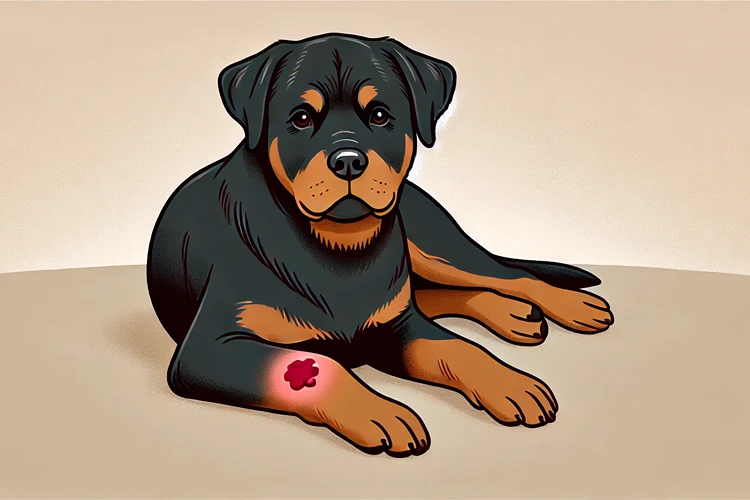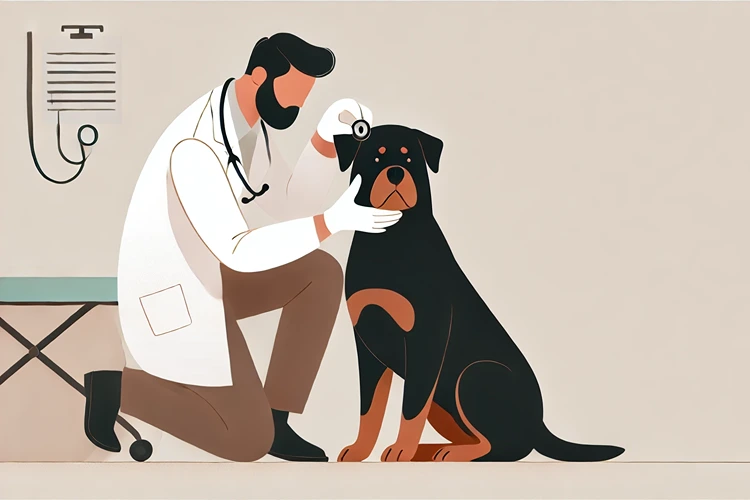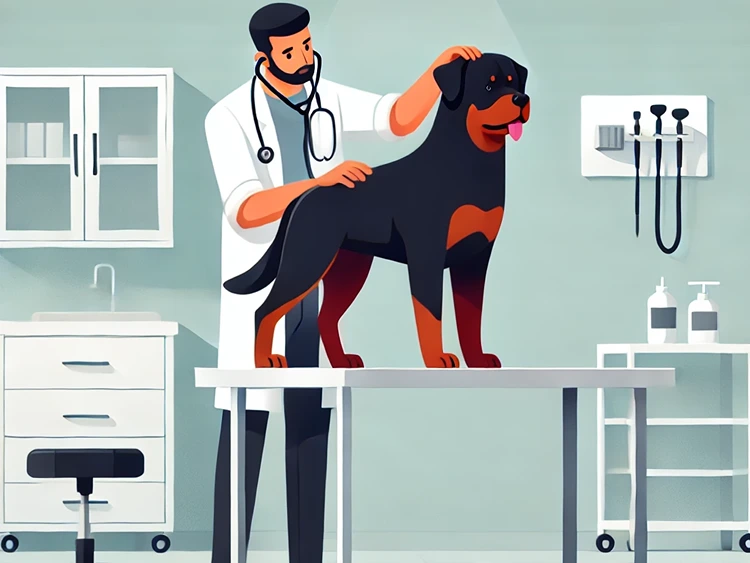Seasonal allergies in Rottweilers can be as troublesome for our furry friends as they are for us. The sneezing, itching, and general discomfort that accompanies allergies can make life difficult for Rottweilers, especially during certain times of the year. Understanding how to manage these allergies naturally can help you keep your Rottie comfortable and healthy.
In this article, we’ll explore how to identify seasonal allergies in Rottweilers, delve into natural remedies, and share some tips to help your Rottweiler cope with the symptoms. Whether it’s springtime pollen or autumn leaves causing the problem, these natural strategies can provide relief and help manage seasonal allergies effectively.
What Causes Seasonal Allergies in Rottweilers?
Just like humans, Rottweilers can be allergic to various environmental factors. These allergies are often triggered by seasonal changes, such as the blooming of plants in spring or the shedding of leaves in fall. Common allergens include pollen, mold spores, and dust mites, all of which can cause a range of symptoms in your Rottweiler.
When these allergens are inhaled or come into contact with your dog’s skin, they can trigger an immune response. The body mistakenly identifies these harmless substances as threats, leading to symptoms like itching, sneezing, and watery eyes. Knowing what causes these allergies is the first step in managing them effectively.
Common Allergens and Their Peak Seasons
| Allergen | Peak Season |
|---|---|
| Pollen (Trees) | Spring |
| Pollen (Grass) | Late Spring to Early Summer |
| Pollen (Weeds) | Late Summer to Fall |
| Mold Spores | Fall |
| Dust Mites | Year-Round |
How Do I Know If My Rottweiler Has Seasonal Allergies?
Recognizing the signs of seasonal allergies in Rottweilers can be tricky, as they often mimic other conditions. Common symptoms include:
- Itching and Scratching: Constant scratching, especially around the face, paws, and belly.
- Red, Inflamed Skin: Skin irritation and redness, often exacerbated by scratching.
- Watery Eyes: Excessive tearing or discharge from the eyes.
- Sneezing: Frequent sneezing, particularly during high pollen times.
- Ear Infections: Recurring ear infections that coincide with seasonal changes.
If you notice these symptoms, especially during certain times of the year, your Rottweiler may be suffering from seasonal allergies.
When Should I Consult a Veterinarian?
While managing seasonal allergies naturally can be effective, it’s crucial to know when to consult a veterinarian. If your Rottweiler’s symptoms are severe or persistent, it’s time to seek professional advice. A vet can rule out other conditions, such as infections or food allergies, and may recommend allergy testing to pinpoint the exact cause of your dog’s discomfort.
Paw-some Tip:
If your Rottweiler is scratching more than usual, try giving them a soothing oatmeal bath. Oatmeal is known for its skin-calming properties and can help reduce itching and irritation.
Natural Remedies for Managing Seasonal Allergies in Rottweilers
There are several natural remedies you can try to alleviate your Rottweiler’s seasonal allergy symptoms. These remedies focus on soothing the symptoms and supporting your dog’s overall health without the side effects of medications.
1. Coconut Oil
Coconut oil is a popular natural remedy for a variety of health issues in dogs, including allergies. Its anti-inflammatory and moisturizing properties can help soothe itchy, irritated skin. You can apply coconut oil directly to affected areas or add a small amount to your Rottweiler’s diet to boost their immune system.
2. Apple Cider Vinegar
Apple cider vinegar is another versatile remedy that can help manage allergies. Diluting apple cider vinegar with water and using it as a rinse after a bath can reduce itchiness and kill off any bacteria or yeast that might be contributing to skin irritation. It’s important to dilute it properly to avoid further irritation.
3. Quercetin
Often referred to as “nature’s Benadryl,” quercetin is a natural flavonoid found in many fruits and vegetables. It has anti-inflammatory and antihistamine properties, making it effective in reducing allergy symptoms. You can find quercetin supplements designed for dogs, but always consult with your vet before introducing new supplements to your Rottweiler’s diet.
Paw-some Tip:
Mix a teaspoon of local honey into your Rottweiler’s food. The idea is that small amounts of local pollen in the honey can help your dog build up immunity to local allergens over time.
4. Omega-3 Fatty Acids
Omega-3 fatty acids are essential for maintaining healthy skin and coat in dogs. They have anti-inflammatory properties that can help reduce the severity of allergic reactions. You can find omega-3 supplements specifically designed for dogs, or you can add fish oil to your Rottweiler’s diet to increase their intake of these beneficial fatty acids.
5. Chamomile Tea Rinse
Chamomile tea isn’t just for humans; it can also provide relief for dogs with itchy skin. Brewing a strong cup of chamomile tea, letting it cool, and using it as a rinse after a bath can soothe irritated skin. Chamomile has natural anti-inflammatory and antimicrobial properties that can help calm allergic reactions.
Tips for Preventing Seasonal Allergies in Rottweilers
Prevention is always better than cure, especially when it comes to managing seasonal allergies in Rottweilers. While you can’t completely eliminate exposure to allergens, there are steps you can take to minimize your dog’s discomfort during allergy season.
1. Regular Baths and Grooming

Keeping your Rottweiler clean is one of the most effective ways to reduce allergy symptoms. Regular baths, especially with hypoallergenic or oatmeal-based shampoos, can wash away allergens like pollen and dust that accumulate on your dog’s coat. Make sure to dry your dog thoroughly to prevent skin infections.
2. Clean Your Dog’s Living Environment
Allergens can easily accumulate in your home, so keeping your dog’s living area clean is crucial. Regularly vacuum your carpets, wash your dog’s bedding, and clean any surfaces where allergens might collect. Consider using air purifiers with HEPA filters to reduce airborne allergens in your home.
3. Maintain a Healthy Diet
A balanced diet rich in essential nutrients can help boost your Rottweiler’s immune system, making them less susceptible to allergies. Incorporate foods that are high in omega-3 fatty acids, antioxidants, and probiotics to support your dog’s overall health and reduce inflammation.
Rottie Stats:
According to recent studies, over 10% of dogs in the U.S. suffer from seasonal allergies, with symptoms peaking during the spring and fall months. Rottweilers, with their strong immune systems, are not immune to these issues, but proper care can significantly reduce their impact.
4. Aloe Vera
Aloe vera is well-known for its soothing properties, especially for skin issues. Applying aloe vera gel directly to your Rottweiler’s irritated skin can help reduce inflammation and provide relief from itching. Ensure you use a pet-safe aloe vera product, as some formulations intended for humans may contain additives that are harmful to dogs.
5. Epsom Salt Baths
Epsom salt baths can be very calming for dogs suffering from itchy skin due to allergies. The magnesium in Epsom salt can help to reduce inflammation and draw out toxins. Fill a tub with warm water, add Epsom salt, and let your Rottweiler soak for about 10-15 minutes. This can also help to relieve any muscle soreness your dog may have.
6. Probiotics
Probiotics can play a crucial role in managing your Rottweiler’s allergies by supporting a healthy gut. A balanced gut microbiome can boost your dog’s immune system and reduce the severity of allergic reactions. You can find probiotics formulated specifically for dogs, or consult your vet about adding natural probiotic-rich foods like plain yogurt to your dog’s diet.
Paw-some Tip:
If your Rottweiler has sensitive skin, consider switching to a hypoallergenic shampoo. These shampoos are formulated to minimize irritation and can be more soothing for dogs with seasonal allergies.
7. Calendula Salve
Calendula is a natural herb with powerful anti-inflammatory properties. You can use calendula salve on your Rottweiler’s skin to soothe redness and irritation caused by allergies. The salve can be applied to any inflamed areas, and it’s gentle enough to be used regularly during allergy season.
Creating a Safe Environment for Your Rottweiler
1. Minimize Outdoor Exposure During Peak Allergy Seasons
During high pollen seasons, limit your Rottweiler’s outdoor time, especially during early morning and late afternoon when pollen counts are highest. If your dog enjoys spending time outside, consider shorter walks or playtimes when pollen levels are lower.
2. Use Air Purifiers Indoors

Using air purifiers with HEPA filters can significantly reduce airborne allergens in your home. These purifiers trap pollen, dust, and other particles, creating a cleaner environment for your Rottweiler. Place the purifiers in areas where your dog spends the most time, such as the living room and bedroom.
3. Wash Your Dog’s Paws After Walks
Pollen and other allergens can easily accumulate on your dog’s paws during walks. Wipe your Rottweiler’s paws with a damp cloth or use pet-safe wipes after outdoor activities. This simple step can prevent allergens from being tracked into your home and reduce skin irritation.
Rottie Stats:
Studies show that regular grooming, including washing paws after walks, can reduce a dog’s exposure to allergens by up to 85%. This simple habit can make a big difference in managing seasonal allergies.
When to Consider Medications for Severe Allergies
While natural remedies and environmental controls can be highly effective, there are times when medications may be necessary to manage severe allergies in Rottweilers. If your dog’s symptoms are severe or do not improve with natural treatments, it may be time to explore medical options with your veterinarian.
1. Antihistamines
Antihistamines like Benadryl can be used to manage allergy symptoms in dogs. These medications work by blocking the effects of histamine, a chemical released during allergic reactions. However, it’s essential to consult your vet before giving your Rottweiler any medication, as dosages vary based on size and health.
2. Steroids
In more severe cases, your vet may recommend corticosteroids to reduce inflammation and provide relief from allergy symptoms. Steroids are typically prescribed for short-term use due to potential side effects, so it’s crucial to follow your vet’s guidance closely.
3. Allergy Shots (Immunotherapy)
Allergy shots, or immunotherapy, can be a long-term solution for Rottweilers with chronic allergies. This treatment involves injecting small amounts of the allergen to help your dog build immunity over time. It’s a more involved process but can be highly effective for dogs with severe or persistent allergies.
Managing Allergies: A Long-Term Commitment
Managing seasonal allergies in Rottweilers requires ongoing attention and care. While natural remedies and preventive measures can go a long way in keeping your dog comfortable, it’s essential to monitor your Rottweiler’s symptoms and adjust your approach as needed. Regular vet check-ups and being proactive about your dog’s health are key to effectively managing allergies.
Natural Remedies vs. Medical Treatments: Pros and Cons
Pros
- Natural remedies often have fewer side effects compared to medications.
- Holistic approaches can improve overall health, not just treat symptoms.
- Many natural remedies are easily accessible and affordable.
- Natural methods encourage a closer bond with your Rottweiler through attentive care.
Cons
- Some natural remedies may take longer to show results compared to medications.
- Effectiveness of natural remedies can vary greatly between individual dogs.
- Severe allergies may still require medical intervention despite natural efforts.
- Not all natural products are safe; some may cause additional irritation or reactions.
Regular Check-Ups Are Essential
Regular veterinary check-ups are crucial for keeping your Rottweiler’s allergies in check. Your vet can provide valuable insights, recommend new treatments, and ensure that your dog’s overall health is being maintained. Allergies can sometimes mask other health issues, so it’s essential to keep your vet informed about any changes in your dog’s condition.
Monitoring Your Dog’s Diet
A healthy diet plays a significant role in managing allergies. Ensure your Rottweiler’s diet is rich in nutrients that support skin health and boost the immune system. Work with your vet to identify any food allergies or intolerances that might be contributing to your dog’s symptoms.
Consistency Is Key
Consistency in your approach to managing allergies is essential. Whether it’s sticking to a regular grooming routine, maintaining a clean living environment, or using natural remedies, consistency will help keep your Rottweiler’s allergies under control.
The Pros and Cons section is suitable for this article, as it can help readers weigh the benefits and drawbacks of using natural remedies versus traditional medical treatments for managing seasonal allergies in Rottweilers. Here’s how you can incorporate it:
FAQs
Wrapping Up
Managing seasonal allergies in Rottweilers requires a comprehensive approach that includes natural remedies, preventive measures, and sometimes medical intervention. By understanding the triggers and symptoms of allergies, you can take proactive steps to keep your Rottweiler comfortable throughout allergy season. Whether you opt for coconut oil, apple cider vinegar, or more advanced treatments like allergy shots, the key is consistency and vigilance in your care routine.
Remember, regular check-ups with your vet, a balanced diet, and maintaining a clean environment are essential in managing your Rottweiler’s allergies effectively. By following the tips and strategies outlined in this article, you can help your Rottie live a happy, healthy, and itch-free life, even during the most challenging seasons.




